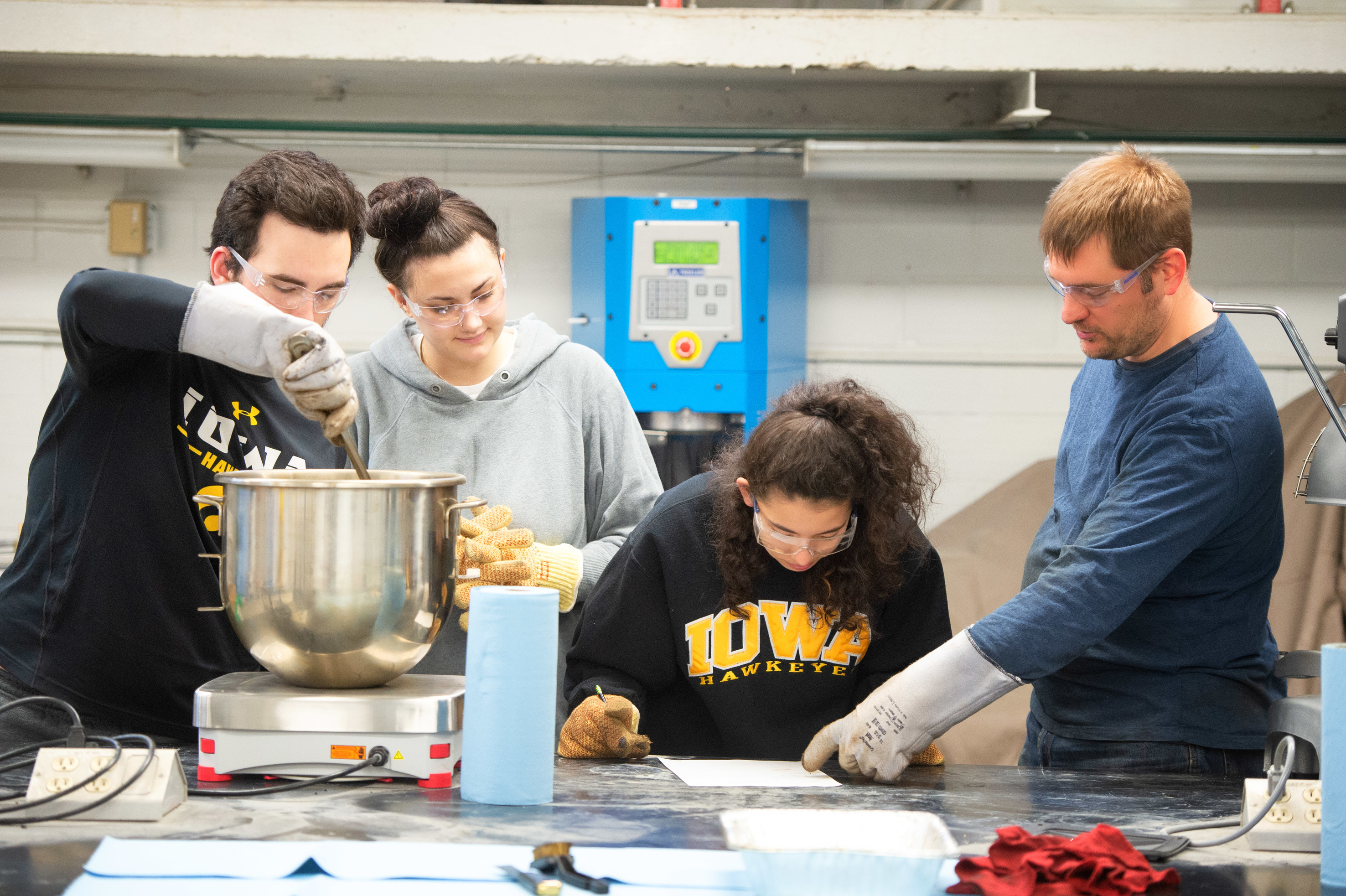Main navigation
Structures, Mechanics, and Materials At Iowa
The M.S. and Ph.D. programs in Structures, Mechanics, and Materials (SMM) are designed for those students interested in developing specialized knowledge and skills in the mechanics of solids and structures that can be applied to both Civil Infrastructure Systems (CIS) and other fields as well. The SMM research focus and graduate curriculum are geared toward developing appropriate methodologies for effectively tackling complex and broad issues related to Civil Infrastructure Systems (CIS), and also, to educate engineers to implement the developed methodologies in actual practice. Frequently, the technologies developed in our program can be applied not only to CIS issues but also in other fields such as biomechanics/biomedicine, the automotive, earth moving and aerospace industries, new materials development, and microelectronics.
The Ph.D. degree typically takes from three to five academic years to complete, and prepares graduates for a wide range of careers in academic institutions, research organizations, and advanced applications in various industries. At least forty two (42) course credit hours are required for the Ph.D. degree, of which up to twenty-four (24) can possibly be transferred in from a preceding M.S. program.

Structure, Mechanics and Materials Graduate Admission Requirements
A number of factors are considered for admission to the Graduate program including undergraduate and/or graduate grade point averages, quality of undergraduate and/or graduate course work, work experience, recommendation letters, professional training, a concise statement-of-purpose, current resume, GRE scores, and TOEFL scores where applicable.
The Graduate Record Examination (GRE) must be taken prior to admission. A GRE score of at least 301 (Verbal & Quantitative) is recommended. The TOEFL exam is required for admission for students whose native language is other than English. A minimum TOEFL score of 81 for the internet-based exam is required.
Students who do not have an undergraduate B.S. degree in civil engineering but who have adequate training in mathematics or science may be admitted for graduate study in the Department of Civil and Environmental Engineering. Without, certain undergraduate courses may need to be taken without graduate credit.
Master's Degree
Prospective MS students must hold a bachelor's degree or its equivalent from an accredited institution with preparation appropriate to advanced study in the proposed major field. Conditional admission may be given to an undergraduate who is within six semester hours of having satisfied these requirements.
A minimum undergraduate grade point average of 3.0 is required for admission. Some program options have higher requirements as listed. The grade point average is computed on the basis of undergraduate and graduate work if the student has less than 12 graduate hours, or on the basis of graduate work only, if the student has completed 12 or more graduate hours.
Doctoral Degree
Admission to a doctoral program normally requires the completion of a Master's degree or equivalent, with a 3.0 minimum grade point average on completed graduate work. A Master's degree with thesis is desirable. Admission as a Ph.D. student is provisional until the student successfully completes a qualifying or comprehensive examination.
Structures, Mechanics, and Materials Curriculum
PhD (72 SH) effective Fall 2017
14 classes = 5 Core + 1 communication + 8 electives + 1 hour ethics seminar = 43 SH
Research = 29 SH
MS-Thesis (30 SH) effective Fall 2019
8 classes = 5 Core + 1 communication + 2 electives + 1 hour ethics seminar = 25 SH Research = 5 SH
MS Non-Thesis (31 SH) effective Fall 2019
10 classes = 3 Core + Practicums A & B + 6 electives + 1 hour ethics seminar = 31 SH
Core Classes – offered every year
- Engineering Design Optimization (CEE:4512)
- Mathematical Methods in Engineering (CEE:5513)
- Intermediate Mechanics of Deformable Bodies (CEE:5540)
- Finite Element I (CEE:4533)
- Continuum Mechanics (CEE:5179)
- Informatics for Sustainable Systems (CEE:5310)
Communication Classes
- Technical Communication (CEE:5225, CEE:6225, or other approved 3 SH course)-not required for MS non-thesis.
SMM Electives for MS degree
- Numerical Calculations (CEE:4511)
- Fundamentals of Vibrations (CEE:4532)
- Optimization of structural systems (CEE:5236)
- Structural systems for buildings (CEE:4162)
- Computer-Aided Engineering (CEE:4515)
- Design of Steel Structures (CEE:4535)
- Health Monitoring of Structural & Mechanical Systems (CEE:4135)
- Design of Concrete Structures (CEE:4506)
- Design of Wood Structures (CEE:4164)
- Foundations of Structures (CEE:4539)
- Fracture Mechanics (CEE:5549)
- Introduction to Bridge Engineering (CEE:4160)
- Any approved graduate course in other departments
SMM Electives for PhD degree
- Numerical Calculations (CEE:4511)
- Optimization of structural systems (CEE:5236)
- Health Monitoring of Structural & Mechanical Systems (CEE:4135)
- Fracture Mechanics (CEE:5549)
- Intermediate Kinematics and Dynamics (ME:5154)
- Numerical Analysis: Nonlinear Equations and Approximation Theory (MATH:5800)
- Numerical Analysis: Differential Equations and Linear Algebra (MATH:5810)
- Optimization Techniques (MATH:4820)
- Analytical Methods in Mechanical Systems (CEE:6310)
- Finite Elements II (CEE:6532)
- Applied Optimal Design (CEE:6534)
- Computational Inelasticity (CEE:4543)
- Multiscale Modeling (CEE:7549)
- Advanced Fracture Mechanics (CEE:7250)
- Computational Solid Mechanics (ME:7256)
- Probabilistic Mechanics and Reliability (ME:7257)
- Mechanical Design in Structures (ME:7259)
- Any approved graduate course in other departments
Seminars and Practicums
- Engineering Ethics Seminar (ENGR:7270) – first fall semester only.
- SMM and TI Seminar (CEE:5098) - required every semester.
- Practicum A (CEE:5990)-first semester only.
- Practicum B (CEE: 5991)-second semester only.